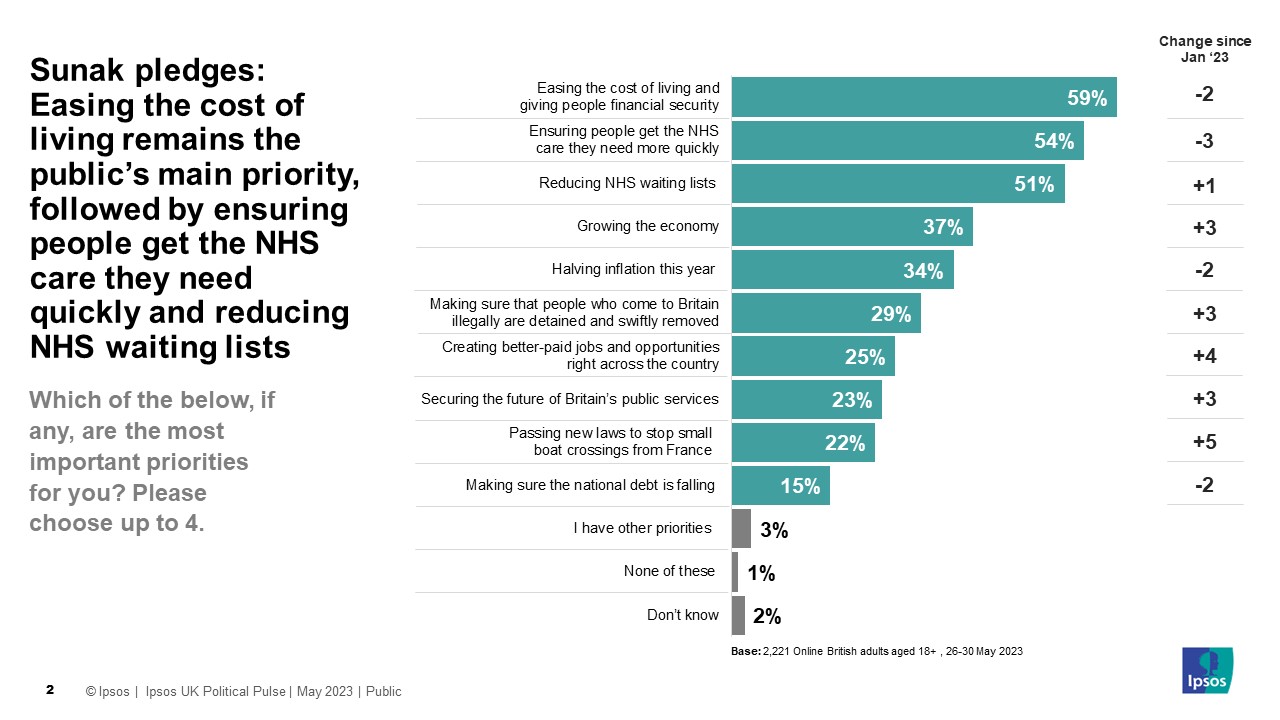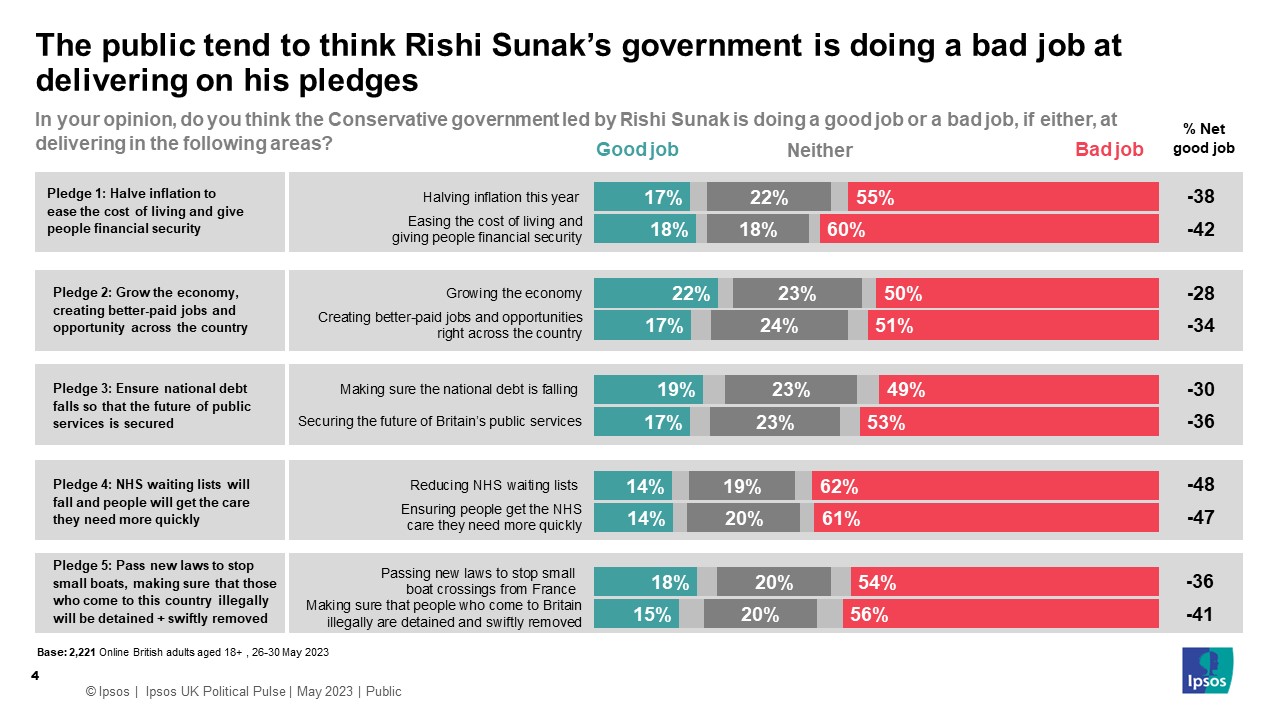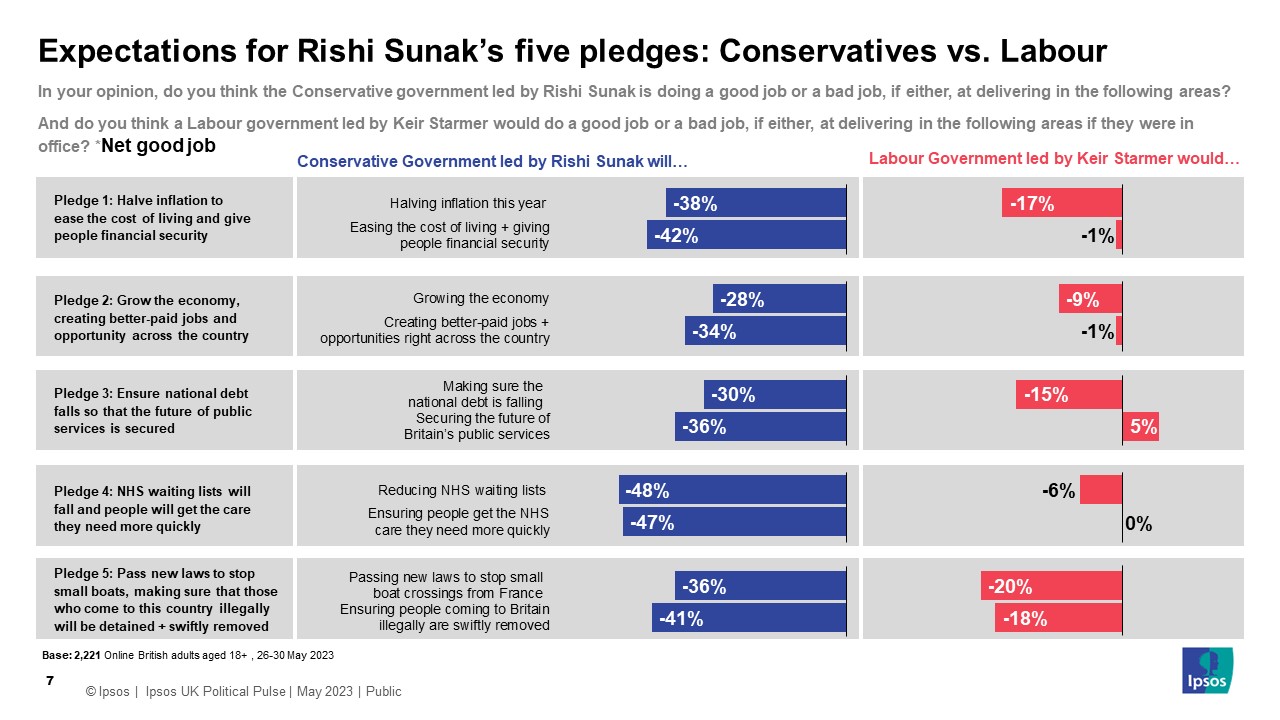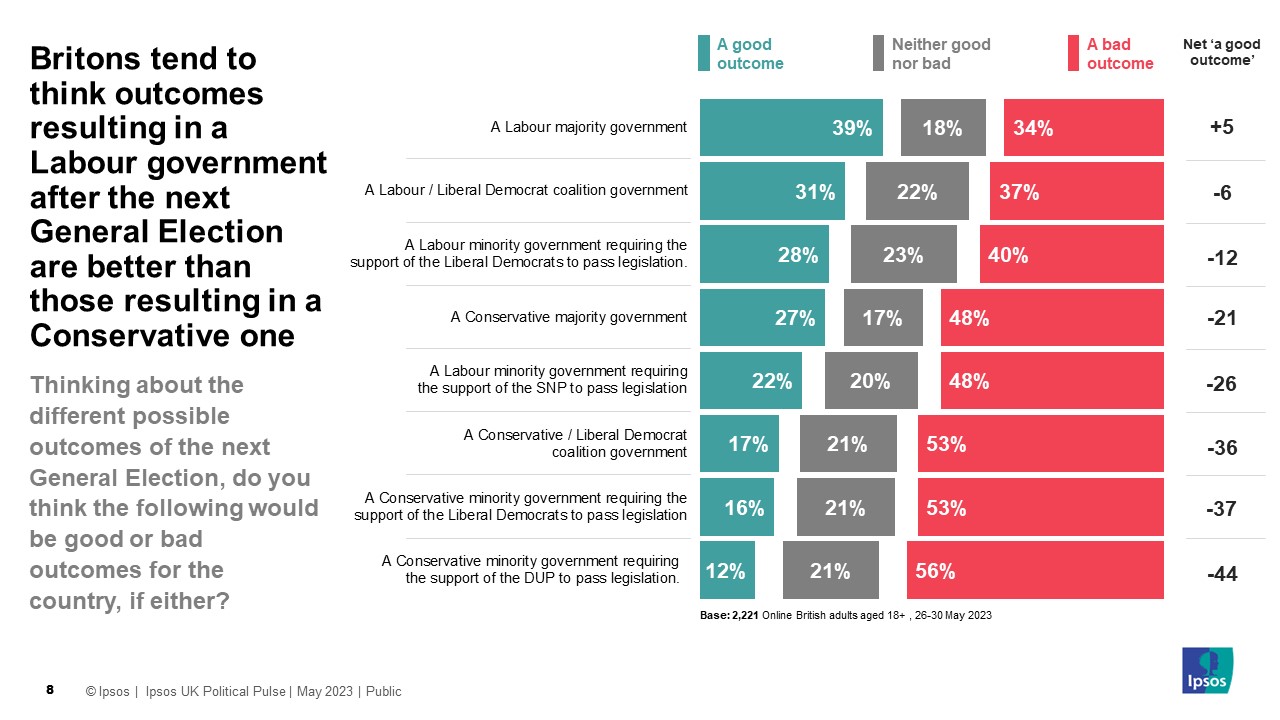6 in 10 Britons think Rishi Sunak’s government doing a ‘bad job’ delivering on cost of living / NHS pledges
- Public think Sunak’s government is doing worst at delivering pledges that are most important to them
- Labour majority seen as the best outcome for the country at the next General Election
The latest Ipsos Political Pulse, conducted online between 26th and 30th May asked the British public which parts of Rishi Sunak’s 5 pledges were most important to them and how his government was doing at delivering on them.
Sunak pledges: which are most important to the public?
Three of Sunak’s pledges were said to be important, by more than half of Britons. The most important priority was easing the cost of living and giving people financial security, which 59% said was important to them (-2pts since January 2023). This was followed by ensuring that people get the NHS care they need more quickly (54%, -3 from January 2023) and reducing NHS waiting lists (51%, +1).

Some differences were observed based on how people voted in 2019. For 2019 Labour voters, easing the cost of living (69%), ensuring people get NHS care more quickly (64%) and reducing NHS waiting lists (59%) were the clear priorities. For Conservative 2019 voters the story is more mixed. Whilst easing the cost of living and ensuring people get NHS treatment more quickly were the top priorities (both 53%), making sure people who come to Britain illegally are detained and swiftly removed was chosen by 48%. Not far off the top priority for this group and effectively tied for third place with reducing NHS waiting lists (48%) and growing the economy (46%).
Sunak pledges: how is Sunak’s government doing?
When asked if Sunak’s government is doing a good or bad job at delivering on each of the pledges, it is notable that his government is generally seen as doing worst at the pledges that are most important to the public overall. For example, 6 in 10 (60%). think Sunak’s government is doing a ‘bad job’ easing the cost of living and giving people financial security (18% say good job). Similarly, just over 6 in 10 think his government is doing a bad job reducing NHS waiting lists (62%, 14% say good job) and ensuring people get the NHS care they need more quickly (61%, 14% good job). However, more generally it should be noted that only around one in five think Sunak’s government is doing a good job delivering on any of the 5 pledges.

The research also asked the public whether they felt a hypothetical Labour government, led by Keir Starmer, would do a good or bad job delivering on these pledges were it in office. A hypothetical Labour government tends to score better than the current Conservative one, even if the public are divided over how it would do, rather than overtly positive.
The public are essentially net neutral on whether a hypothetical Labour government would do a good job or a bad job on easing the cost of living (33% good job, 34% bad job, net -1) and ensuring people get the NHS treatment they need more quickly (34% good job, 34% bad job, net of zero). However, these net scores are better than the Conservatives -42 and -47 on these measure respectively. A full list of net scores for both parties can be found below, with the public most sceptical Labour would deliver on inflation, national debt and small boats / illegal immigration (though scores are still better than the Conservatives overall).

Election outcome
The public were asked to consider what option would be a good outcome at the next general election. 39% say a Labour majority would be a good outcome, with 34% saying it would be a bad outcome. This was the only option that scored a positive ‘net good outcome’ rating (+5). This was followed by a Labour/ Liberal Democrat coalition (31% good outcome; 37% bad outcome’ net -6) and a Labour minority government that would require support from the Liberal Democrats to pass legislation (a good outcome 28%; a bad outcome 40%, net -12). The public are more likely to favour any of these options, than an outright Conservative majority. 27% say that this would be a good outcome, compared to 48% who say it would be a bad outcome (net good outcome -21).

Favourability towards parties and leaders
Our monthly Ipsos Political Pulse tracking questions find that:
- 24% of Britons are favourable towards the Conservatives (no change from April), 53% unfavourable (+1pt).
- 36% are favourable towards the Labour Party (no change), 38% unfavourable (-1pt).
- This means the Conservative’s net favourability score is -29 vs -2 for Labour.
Net favourability scores continue to remain closer for Prime Minister Rishi Sunak (-18, -2 since April) and Keir Starmer (-13, -5 since April). 28% of Britons are favourable towards Rishi Sunak (no change) and 46% are unfavourable (+2). For Keir Starmer 29% are favourable (-1) and 42% unfavourable (+4).
Former Prime Minister Boris Johnson has a net favourability of -34, falling from -24 in February. Over half of Britons are unfavourable towards Boris Johnson (57%), just under a quarter are favourable (23%).
The public were also asked to consider who would make the better Prime Minister out of Rishi Sunak and Boris Johnson. Sunak leads Johnson with 28% saying he would make the Prime Minister, compared to 17% who support Johnson. However over half (51%) said that there was no difference between them, or that neither would make a better Prime Minister. Sunak’s lead over Johnson is mirrored among 2019 Conservative voters, with 40% backing Sunak, compared to 31% who support Johnson.
Direction of the country/ impact of Brexit / Johnson vs Sunak
- 60% of Britons think things are heading in the wrong direction overall (-1 from April) and 18% think things are heading in the right direction (no change)
- 53% think Brexit has had a negative impact on the country (-2 from April) and 22% say positive (+2). This now marks 7 consecutive months of the proportion saying Brexit has had a negative impact being above 50%.
Keiran Pedley, at Ipsos, said:
There is not a lot of good news in these numbers for the Prime Minister. Of his 5 pledges, the public tend to think his government are doing worst in the areas that are most important to them. Meanwhile, when asked about the next General Election, the public tend to prefer outcomes resulting in a Labour government. Rishi Sunak will hope his government can make significant progress in his key policy pledges as the year progresses, in order to give the Conservatives a chance to turn their political fortunes around.
Technical note
Ipsos interviewed a representative sample of 2,221 GB adults aged 18+. Interviews were conducted online from 26-30 May 2023. Data are weighted to match the profile of the population. All polls are subject to a wide range of potential sources of error.






